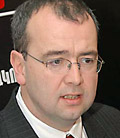The U.S. has provided 1.6 billion dollars to Armenia since independence. This is what U.S. Temporary Charge d’ Affaires of the U.S. Embassy to Armenia Anthony Godfrey announced during a recent press conference.
It is assumed that the topic of the press conference must have been the money provided and to be provided to Armenia. The director of the Yerevan office of the “Millennium Challenges” Corporation Alex Rassin was also participating in the press conference with Godfrey. What’s interesting is that before the press conference, Mr. Godfrey distributed calendars to the journalists, which also gave information regarding U.S. aid to Armenia. It is worth mentioning that the calendars were not enough for everyone because Godfrey had not expected so many journalists to come. That’s kind of incomprehensible-who else can be that interesting if Armenian society ties any kind of election in Armenia with the ones “chosen” by the U.S. or Russia? Whatever; let’s get back to the topic.
As the diplomat mentioned, whereas the first programs were humanitarian, currently they are aimed towards three goals-stability, democracy and economic growth. In fact, that growth must be stable and everyone must benefit from that regardless of where they live-Yerevan or the villages. At the present, a group of Armenian experts headed by Ara Hovsepyan has been formed within the framework of the “Millennium Challenges” project, which is the largest project costing 236 million dollars and is currently under implementation. As Alex Rassin mentioned, this year there will be work on reconstruction of roads and irrigation system planning and the main jobs will begin later. According to Godfrey, the project may be terminated only if the given country doesn’t fulfill the requirements of the “Millennium Challenges” Corporation and that’s rated based on standards. Godfrey said that Armenia has six good ratings for economic freedom. Armenia also has good ratings for investments in human capital.
“We are only worried over fair governance,” mentioned Mr. Godfrey, adding that Armenia has problems with rights and civil freedoms. The U.S. Government has expressed its preoccupations to the Armenian government and the latter has promised to correct the errors. “We have already started a dialogue with the Armenian government regarding that and encourage the efforts made to correct those errors,” said Anthony Godfrey.
The speaker also emphasized that the corporation is proud of this project. It’s obvious-which country wouldn’t be happy if it were able to tell other countries what to do with its 0.0% budget? However what’s interesting is that the corporation is trying to make us Armenians feel proud as well, mentioning that Armenia is one of the 23 countries that had the opportunity to participate in this project; so, Armenia deserves their help. But Armenians can’t really feel that pride when looking at the list of the remaining 22 countries.
Anthony Godfrey informed journalists that George Bush has called on helping the countries where “democracy is developing and corruption is receding”. It was assumed that Mr. Bush implied Armenia if the American diplomat is announcing that in Armenia. It was obvious that journalists would come up with the following question: what are the examples of recession of corruption? In response to this, Godfrey mentioned that he is a careful optimist and said:
“The corruption index is one of the most important indices and it’s something to worry about for Armenia…But the Armenian government has taken on responsibilities and we hope that the government fulfills them.” This was a diplomatic answer with no meaning. However, as Godfrey stated, politicians are sometimes forced to give diplomatic responses. Everyone looks at this as normal. As an example, Godfrey said that as a resident of Yerevan, he already sees the street patrol reforms.
Journalists were also interested in finding out America’s position on the upcoming Armenian parliamentary elections. In November 2005, former Ambassador John Evans and USAID representative Robin Philips announced that the U.S. would provide 6 million dollars to Armenia in order to help conduct democratic parliamentary elections. Godfrey mentioned that the project has already launched and that they are working with the Police and the Department of Passports and Visas on making corrections in voters’ lists, as well as helping with the instruction of electoral commission members. According to Mr. Godfrey, they can’t start some parts of the project because the final date of the elections hasn’t been fixed.
“We believe that the legitimacy of the government depends on governmental support. The more legitimate the government, the better partner it may be for us,” announced Godfrey. Journalists tried to disperse that optimism, reminding Godfrey that the possibility of having fair elections is already in jeopardy because certain powers have airtime and have already begun their campaign, while the opposition is completely deprived of airtime. This time Mr. Godfrey’s reply was very diplomatic, in fact, it practically wasn’t a response.
“This is also another issue that was discussed during political debates in the U.S. It is required in the U.S. that financial provisions made for political goals are transparent. But the role of money in the electoral campaign is very contradicting…” and similar responses.
Journalists tried to clarify some things-what will the U.S. do if the elections are falsified again? Godfrey mentioned that he has been taught not to answer hypothetic questions. But Godfrey gave a “short” response to that question, which wasn’t that hypothetic; of course, in the context of another question. He said that if the upcoming elections are conducted with serious flaws, then the “Millennium Challenges” program may be reviewed out-of-order. In other words, financing may terminate. Nevertheless, Anthony Godfrey is optimistic towards this too. I’m simply amazed and jealous that someone living in Armenia and apparently having contact with the street patrol officers can still be that optimistic.

